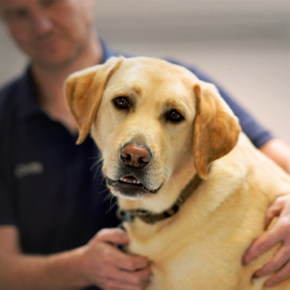
Common dog allergies that can flare up spring
April 7, 2023
[CE_Social_Sharing]Spring is here, and for many of us, that means warmer Somerset & Wiltshire weather, blooming flowers, and spending more time outdoors with our furry companions. However, for dogs, spring can also mean the development or flare-up of allergies…
Dog allergy symptoms to be aware of
Did you know that dogs can be allergic to a variety of things just like humans, including tree and grass pollens, insect and flea bites, dust, and mould. These allergens can be particularly prevalent during the spring. Our veterinary team have put together a handy Dog Allergy Guide to help you get to know the symptoms of allergies to look out for.
Download our Dog Allergy Guide
Spring/summer environmental dog allergies [H3] Hay fever in dogs
Pollen allergies from trees, grass, flowers, and weeds can start in spring and last until autumn for some dogs. All dogs can suffer from pollen allergies (or hay fever) however, it seems to be more common in females and some breeds can be more prone to it, like Labrador Retrievers, Golden Retrievers, Dalmatians, and West Highland Terriers.
With airborne allergens, like pollen, dogs can have symptoms even when they’re nowhere near the source I.e., on the grass. Whereas some dogs may sneeze due to pollen allergies, there are many other more common symptoms to look out for – learn more here.
Mould allergies
Mould allergies can also affect dogs more when spring arrives, particularly in areas with high humidity; house mould should be dealt with as soon as possible.
Dust allergies
Dust allergies can lead to sneezing, breathing difficulties, and other common allergy symptoms
We’ve mentioned this as a ‘spring allergen’ as although it can occur at any time, ‘spring cleaning’ can disturb large amounts of dust and debris.
Flea bites
A whopping 95% of flea eggs, larvae and pupae live in the environment, not on pets. As the temperature warms up in spring, flea activity starts to ramp up. Some dogs are allergic to flea saliva and may have an immediate (within 15 minutes) or a delayed (24 – 48 hours) reaction that is most visible on the skin. If your dog has atopic dermatitis, they will be more prone to a flea saliva allergy.
Atopic dermatitis is a common condition that causes chronic itching, which leads to excessive scratching, biting or licking at the skin, resulting in inflammation of the skin and hair loss. This condition can be caused by an allergic reaction to environmental allergens, such as those above.
What to do if you think your dog is allergic?
If your dog is showing signs of allergies, it’s best to book an appointment with one of our vets. They can determine the cause of your dog’s symptoms and recommend an appropriate course of treatment. In some cases, they may recommend antihistamines or other medications to help control your dog’s symptoms. In more severe cases, they may also recommend an anti-allergy vaccination or topical medications to relieve the symptoms.
IMPORTANT: Never give your dog medication meant for humans, particularly antihistamines, without a vet’s explicit advice and dosage instructions. Some brands may contain harmful ingredients for pets and the dosage may not be the same as it is for humans. It’s also important to keep in mind that while spring is a common time for allergies to surface, dogs can develop allergies or have allergic reactions all year round.
Other reasons why your dog might be scratching
We think that it’s important to understand there may be other reasons for your dog’s scratching and irritation such as:
- Food intolerances
- Dry skin (from a lack of essential fatty acids in the diet, cold weather, or grooming products)
- Over-production of skin yeast or bacteria
- Skin infection
- Mites or lice
- A tick bite
- Behavioural issues such as anxiety or boredom
This is why knowing the other common symptoms of allergies and booking an allergy appointment for your dog is important. The sooner our team can investigate and diagnose, the sooner a treatment plan can be started and you dog’s daily life improved.